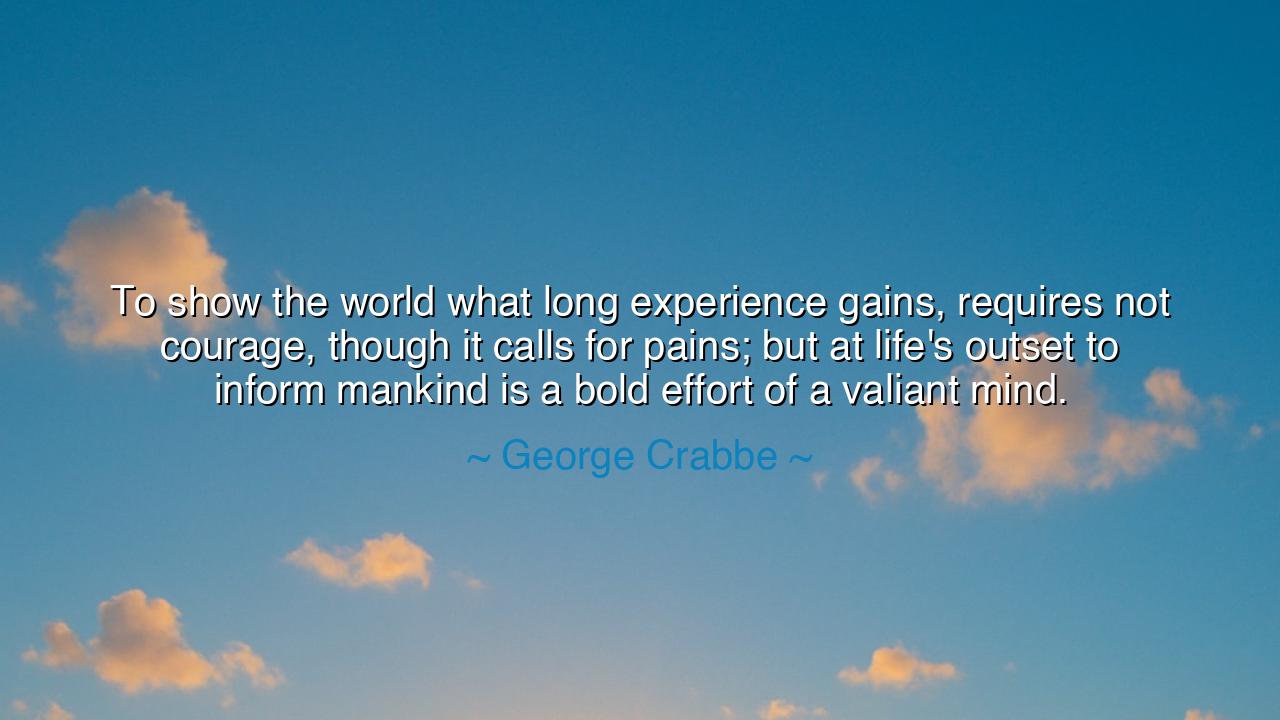
To show the world what long experience gains, requires not
To show the world what long experience gains, requires not courage, though it calls for pains; but at life's outset to inform mankind is a bold effort of a valiant mind.






In the words of George Crabbe, “To show the world what long experience gains, requires not courage, though it calls for pains; but at life's outset to inform mankind is a bold effort of a valiant mind,” we find a reflection as timeless as the dawn — a meditation on wisdom, courage, and the boldness of youth. Crabbe, the English poet of realism and truth, speaks not merely of the act of teaching or writing, but of the spiritual bravery required to bring one’s inner vision into the world. To share wisdom when one is old is natural — the fruit ripens and falls of its own accord. But to rise in the springtime of life, before the world has approved you, before your name carries weight, and to declare what you have seen and believed — that, he says, is the mark of a valiant mind.
The origin of this quote is rooted in the soul of Crabbe’s own journey. Born to humble means in 18th-century England, he labored through hardship and obscurity, finding his voice only after long struggle. He knew the weight of being unproven — of daring to speak when no one yet listens. In his world, as in ours, youth was often dismissed as naïve, its ideas untested. Yet Crabbe recognized that the courage to inform mankind — to stand before one’s elders and the vast indifference of society and say, “This is what I see” — demands not arrogance, but valor. For it is easy to share knowledge after years of triumph, but it is a sacred kind of bravery to offer truth before the world has rewarded you for it.
This courage of the unseasoned heart has been the seed of all great revolutions of thought. Consider the young Isaac Newton, still a student when he conceived the law of gravity. Alone, without title or renown, he looked upon the falling apple and dared to imagine a universe bound by invisible laws. Or recall Joan of Arc, a peasant girl barely seventeen, who stood before kings and armies, guided not by experience, but by conviction — and through her courage, altered the course of history. Such souls embody Crabbe’s truth: that to act upon one’s inner knowledge, while the world calls you unready, is to walk the path of the valiant.
And yet, Crabbe also distinguishes between experience and effort. The elder who shares what he has learned after a lifetime of trial does not need courage, only endurance; the younger, who speaks before his time, requires faith. For youth is a field unplowed, and to sow one’s ideas there is to risk ridicule, misunderstanding, even failure. But it is through such risk that all human progress is born. The philosopher Plato once wrote that courage is “knowing what is not to be feared.” The young visionary, therefore, is not reckless — he simply fears stagnation more than scorn.
There is also in Crabbe’s words a gentle warning. To “show the world what long experience gains” may indeed call for pains, but without humility, even wisdom can turn cold. The young must not speak to boast, but to illuminate; the old must not speak to command, but to share. The valiant mind, then, is not defined by defiance alone, but by sincerity — by the quiet fire that burns to serve truth rather than ego. In every age, those who have changed the world — from Galileo to Mary Shelley, from Martin Luther King Jr. to Malala Yousafzai — were those who spoke before they were invited to. They dared to be the voice that the time itself did not yet recognize it needed.
Thus, the heart of Crabbe’s teaching is that wisdom and courage are not bound by age, but by will. True courage lies not only in facing enemies, but in facing disbelief — in speaking one’s vision into the void. The young who act upon the stirrings of truth within them become the architects of tomorrow; the old who share their experience with grace become its guardians. Both are necessary for the harmony of the world — for knowledge to endure and courage to renew it.
Let this then be the lesson: speak when truth moves you, whether the world calls you seasoned or untested. Do not wait for permission to express what is just, beautiful, or wise. The timid wait until they are certain; the valiant act while they still doubt. In your art, in your work, in your very life, dare to inform mankind, to offer what insight burns within you — even if your voice trembles. For it is through such efforts that civilization itself moves forward, carried always by those who, like Crabbe’s valiant mind, have the bravery to speak before their time.
So remember, O seeker of wisdom: courage is not found only on battlefields or in great deeds. It is found in the young poet who dares to write, in the thinker who dares to question, in the soul who dares to stand alone for truth. To show the world your light before the sun of experience has risen upon you — that is the most heroic act of all.






AAdministratorAdministrator
Welcome, honored guests. Please leave a comment, we will respond soon